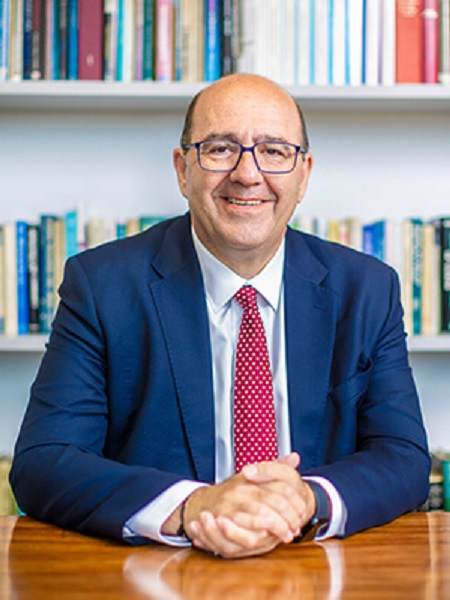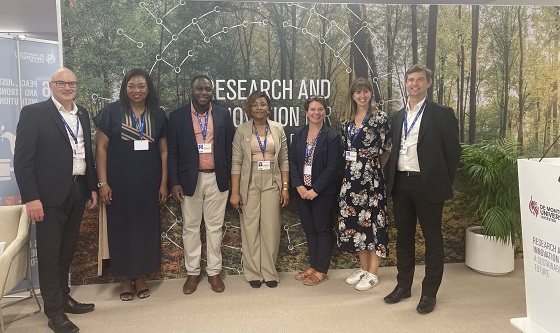As the first week of COP28 in Dubai reaches an end, Professor Mike Kagioglou, PVC Research and Business Innovation, reflects on the impact DMU has already had as the only UK university to have a pavilion in the Blue Zone, where the climate negotiations take place.
DMU merits a place on the world stage and this past week that is exactly what has been happening at the COP28 climate action talks in Dubai.
A team of our academics, researchers and senior leadership have been official United Nations observers as world leaders gather and negotiate to find ways to deal with the climate emergency facing our planet.

Observers, such as DMU, have been presenting their research, evidence and views and attending sessions on climate change, health, the built environments and spending. This information is then disseminated to inform policy for the United Nations and governments of the world.
We have a place at the top table of talks on the climate and our place at that table as an official observer is down to the long history of climate change research dating back to the early 1990s when we worked closely with the City of Leicester, Britain’s first Environment City, who also represented Europe at the Earth Summit in Rio de Janeiro.
DMU is at COP28 because we want to enhance our partnerships. We also want to work with other sectors, other partners, and to find like-minded institutions.
We are in good company. In neighbouring pavilions are Monash University, Australia; Penn State, George Washington, Yale and Maryland universities in the United States; the University of Toronto, Canada; Monterrey in Mexico; and the University of Cambridge in England.
Having a pavilion in the Blue Zone, at the heart of negotiations, means that we are able to use our space for collaborations and engaging with NGOs, banks, trade organisations and policymakers across the two weeks. It has also meant a series of visits from prospective students interested in studying at DMU.
RELATED NEWS
Read more about DMU at COP28
DMU's SDG work in spotlight
Decolonising DMU wins Green Gown Award
A Malawi King, HRM Inkosi Ya Makosi Gomani held long discussions with our researchers, including Professor Rafaella Villa, on the potential for future collaborations with his country on biofuels. His passions are the protection and restoration of trees and forests to protect climate and halt land degradation in Malawi, which is a predominantly agriculture-based economy.
Professor Villa’s PhD student Ogemdi Anika has also spoken to officials in Zimbabwe who want to access her expertise in methane capture and biogas.
Princess Adejoke Orelope-Adefulire, Senior Special Assistant to the Nigerian President on the Sustainable Development Goals, and Nigerian Princess HE Toyin Ojora Saraki, the founder and President of the Well-Being Foundation Africa, were also visitors to discuss collaborations. There were also visits by mayors from around the world, including the Ukraine, Australia and Sierra Leonne as part of the C40 Cities organisation.

DMU's Research and Innovation team at COP28 in Dubai
Professor Muyiwa Oyinlola and PhD researcher Abimbola Okoya also met with the President of Nigeria, Bola Tinubu, and the President of the Africa Development Bank, Dr Akinwumi A. Adesina. The university has a proud history of working with Nigeria on projects around capacity building and dealing with waste pollution in the country.
Our delegation has also had chance encounters with the former United States First Lady and American Secretary of State Hilary Clinton and the Shadow Foreign Secretary David Lammy, who was visiting the British Pavilion at the same time. This has been on top of a series of engagements with the British government on a series of issues.
All of this is important in putting De Montfort University on the world stage and getting the university known among world leaders. This would not happen if we weren’t attending COP28.
We believe that we can build on this legacy in the coming years and establish De Montfort University on the world stage, with research and innovation in sustainability as an important part of that strategy.
Posted on Thursday 7 December 2023